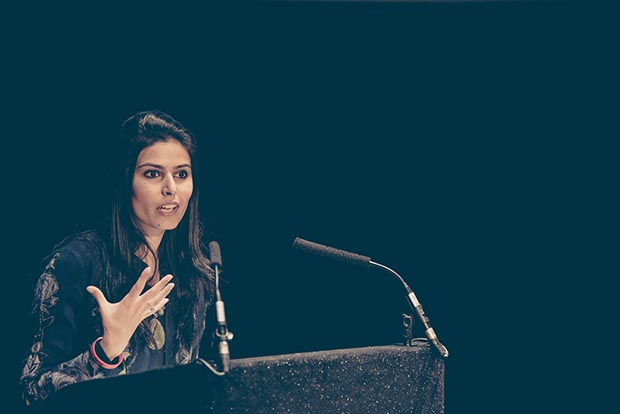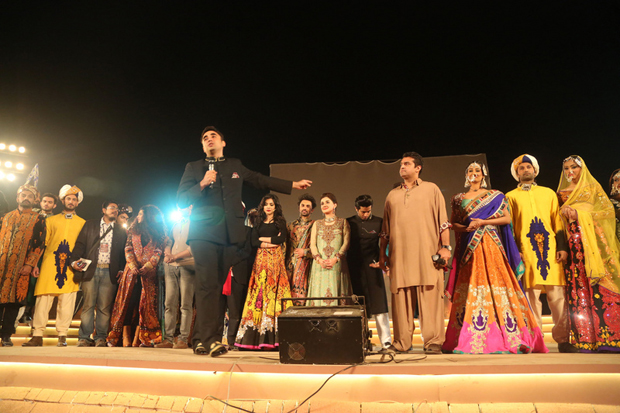Bolo Bhi: Pakistan’s cyber crimes bill needs major changes

Farieha Aziz, director of 2016 Freedom of Expression Campaigning Award winner Bolo Bhi (Photo: Elina Kansikas for Index on Censorship)
The cyber crimes bill passed by Pakistan’s lower legislative chamber is unacceptable and needs major changes, Bolo Bhi told Index on Censorship.
Fareiah Aziz, director of Bolo Bhi, said the group is ready to pick up the fight against the Prevention of Electronic Crimes Act, which was passed by Pakistan’s National Assembly on Wednesday 13 April. The bill must now be approved by the senate.
“We need the senate to change the bill significantly, if not completely,” Aziz said. “A few amendments are not going to be enough.”
Aziz was in London for the Index on Censorship 2016 Freedom of Expression Awards, where she accepted the Campaigning Award on behalf of Bolo Bhi.
The bill, which stems from the 20-point National Action Plan against terrorism prime minister Nawaz Sharif announced after the Peshawar attack and was presented to the national assembly by an expert committee established by the standing committee for IT, has caused uproar in civil society for its restrictions of human rights and free speech.
According to Bolo Bhi, some of the major concerns are the criminalisation of political criticism and political expression; the overreaching and discretionary powers given to the media regulator; the harsh punishments and fines for hate speech; and the lack of protection for journalists and of adequately set procedures.
Additionally, the group has also lamented a critical lack of transparency in the drafting process, claiming the government deliberately avoided making the proposed text available to the public.
According to Dawn, the bill also shows a critical lack of IT expertise.
Aziz told Index on Censorship that Bolo Bhi expected the bill to be approved by the national assembly, and has been lobbying the senate since August 2015.
“We already have commitments from senators, including the chairman, who said very publicly in one of the sessions that this bill is not going to pass in its current version.”
“The senate is more balanced, and the opposition has the majority, whereas the government has a 2/3 majority in the national assembly,” she said.
However, Aziz warned the greatest risk is that senators settle for a few amendments to the bill instead of changing everything that needs changing.
“It’s the oldest trick in the book,” she said. “Make changes here and there, accept a few amendments, and then say that you’ve done what you could do. But that’s not going to be enough.
“We’ve seen this before with the introduction of military courts and the Protection of Pakistan Bill 2014. There was always an outcry by opposition parties, especially about the Protection of Pakistan Bill, but then they settled for a few amendments and all went through.”
Aziz said Bolo Bhi is already working to organise public and academic debate around the bill, and to make sure the senate has a clause by clause discussion.
Bolo Bhi, which means “speak up” in urdu, has been fighting the bill for over a year. They have been lobbying with members of the opposition and other organisations against the bill since then, shedding light on the legislation, organising public debates and creating a timeline tracking cybercrime legislation with information on every development.
Salient features of bill, according to Dawn:
- Up to five year imprisonment, $95.000 fine or both for hate speech, or trying to create disputes and spread hatred on the basis of religion or sectarianism.
- Up to five year imprisonment, $48.000 fine or both for transferring or copying of sensitive basic information.
- Up to $480 fine for sending messages irritating to others or for marketing purposes. If the crime is repeated, the punishment would be three months imprisonment and a fine of up to $9.500.
- Up to three year imprisonment and a fine of up to £4.800 for creating a website for negative purposes.
- Up to one year imprisonment or a fine of up to $9.500 for forcing an individual for immoral activity, or publishing an individual’s picture without consent, sending obscene messages or unnecessary cyber interference.
- Up to seven year imprisonment, a fine of $95.000 or both for interfering in sensitive data information systems.
- Three month imprisonment or a $480 fine or both for accessing unauthorised data.
- Three year imprisonment and a fine of up to $48.000 for obtaining information about an individual’s identification, selling the information or retaining it with self.
- Up to three year imprisonment and a fine of up to $4.800 for issuing a sim card in an unauthorised manner.
- Up to three year imprisonment and fine of up to $9.500 for making changes in a wireless set or a cell phone.
- Up to three year imprisonment and a fine of up to $9.500 for spreading misinformation about an individual.

